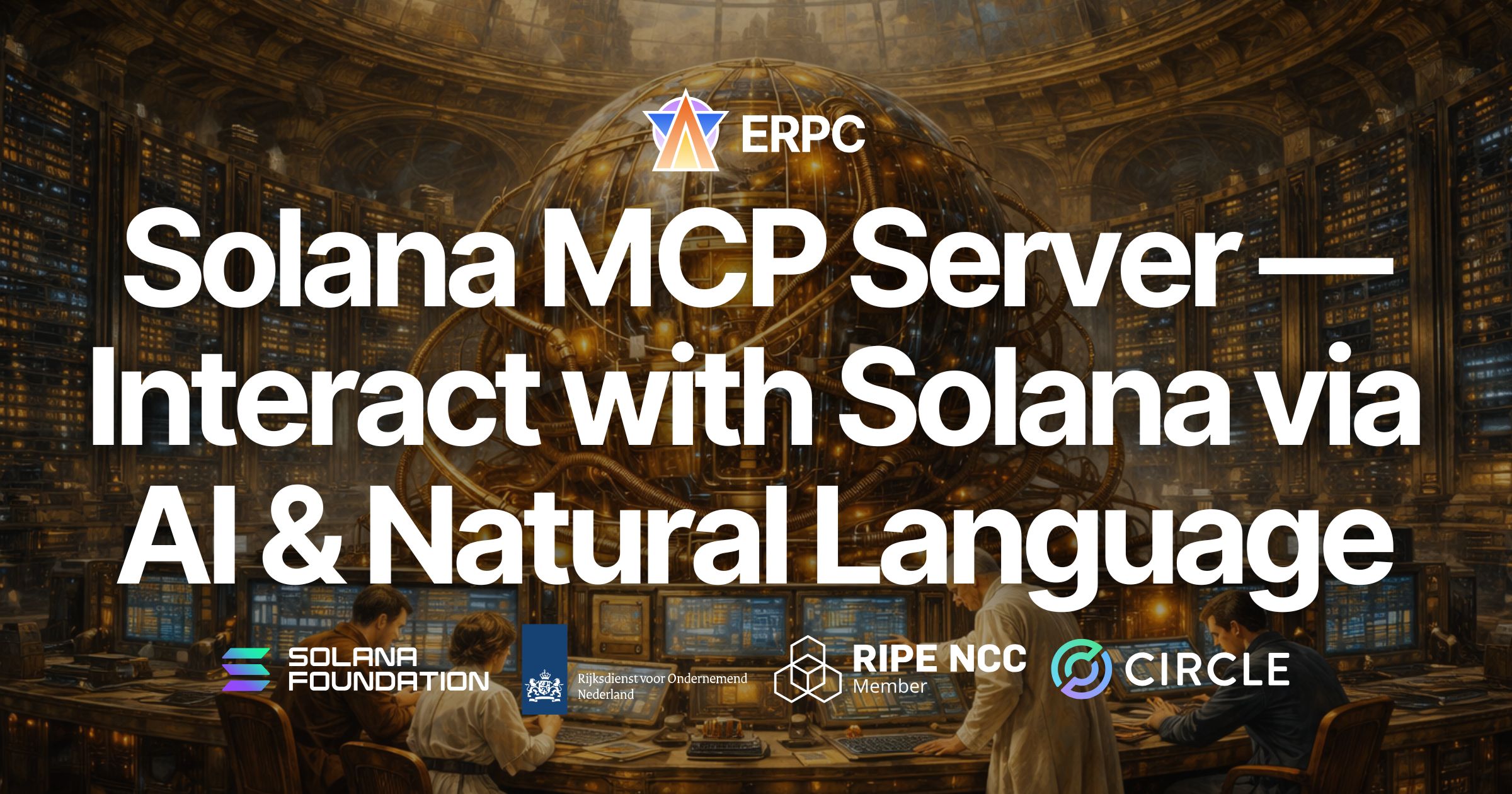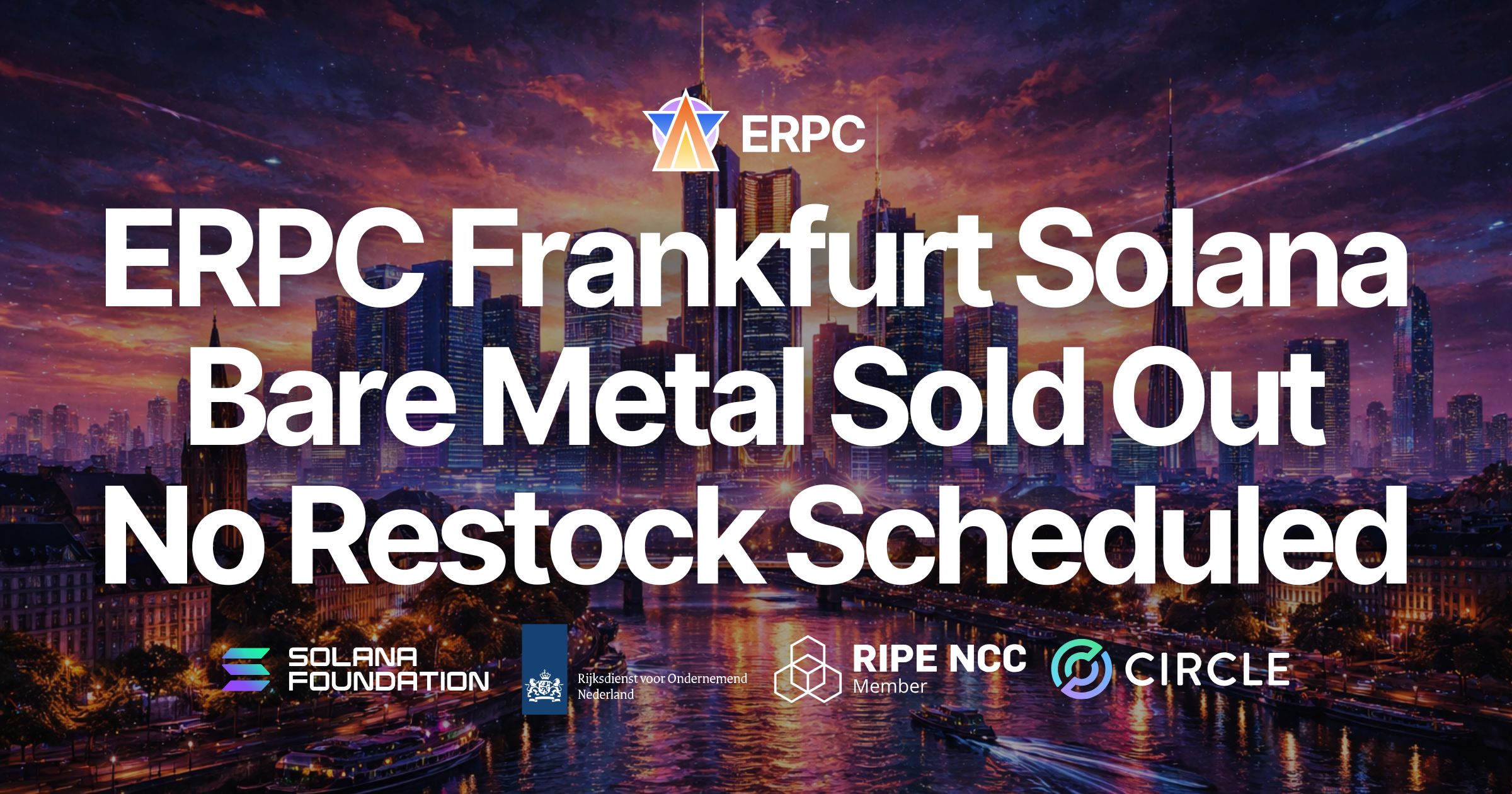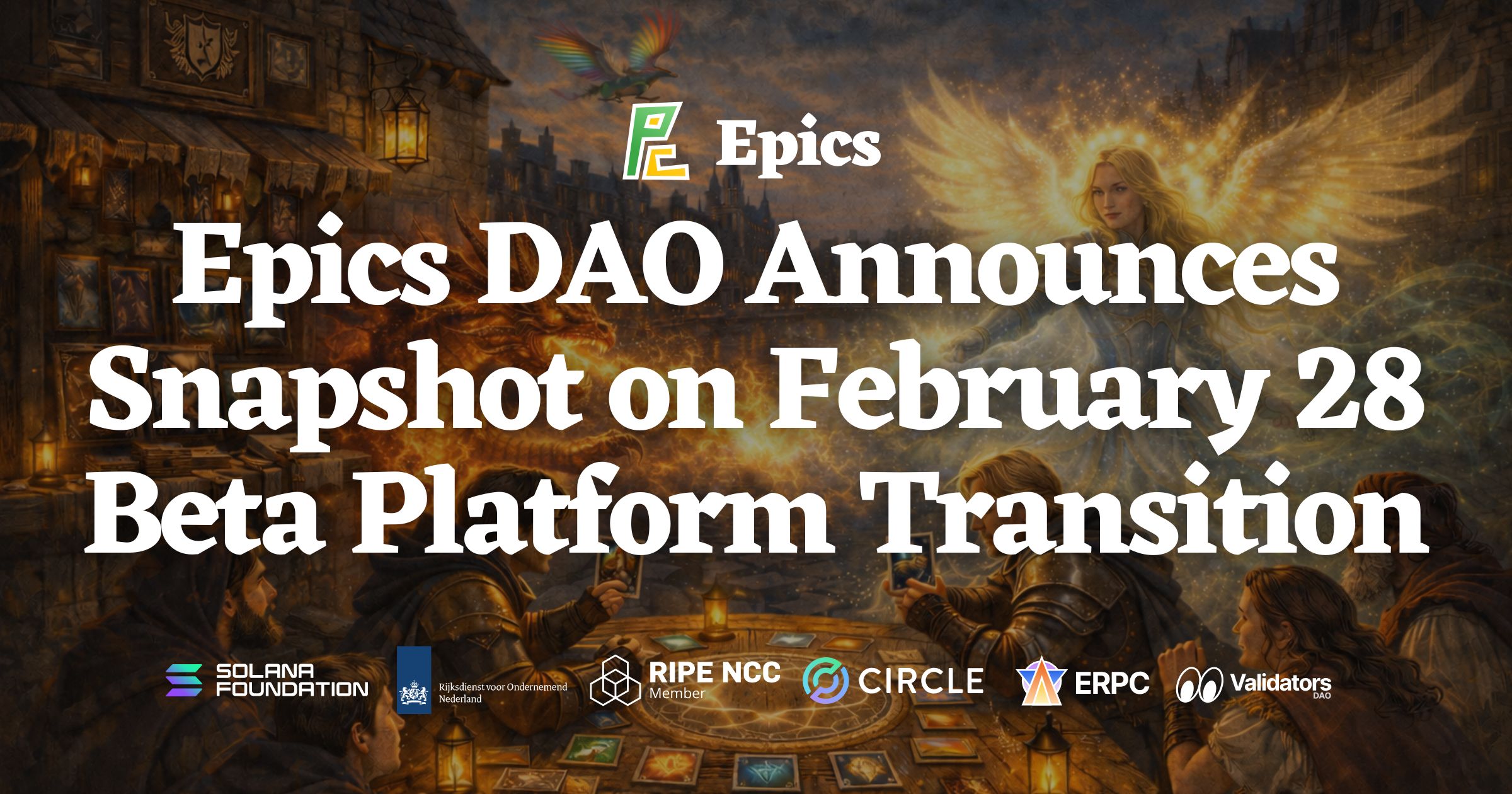ERPC Launches Premium VPS to Salt Lake City (SLC), Strengthening U.S. West Network Core with Solana DoubleZero CHI–SLC–LAX Private Link
ERPC Launches Premium VPS to Salt Lake City (SLC), Strengthening U.S. West Network Core with Solana DoubleZero CHI–SLC–LAX Private Link
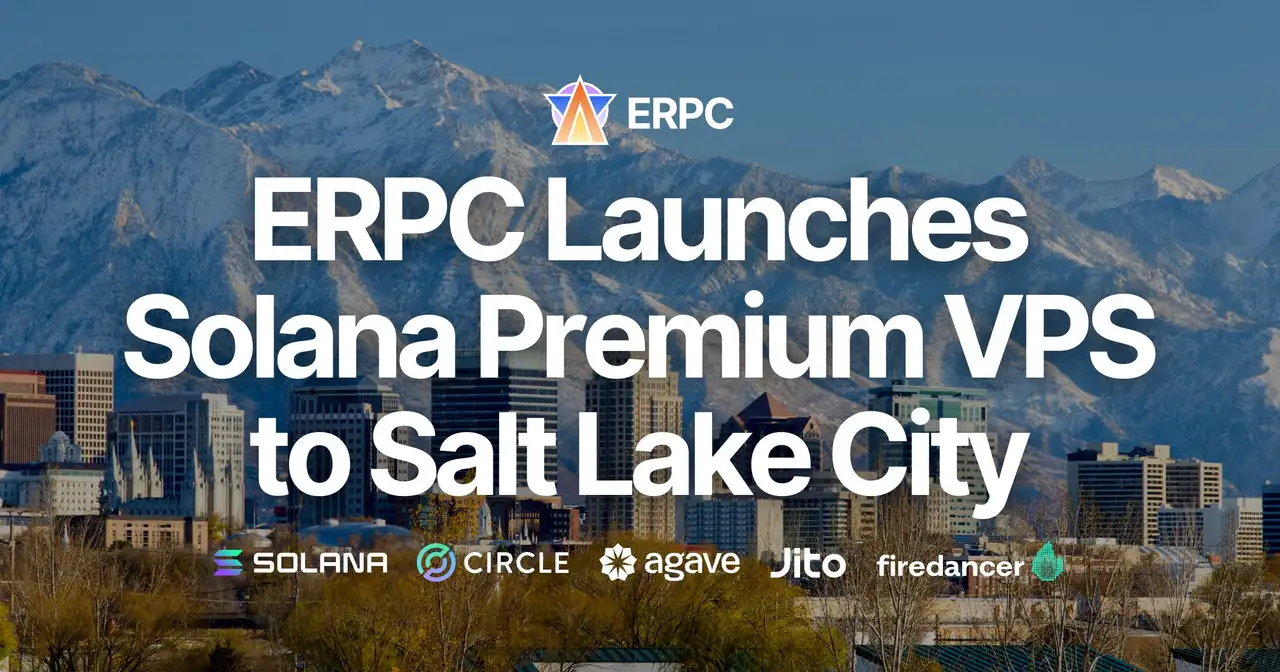
ELSOUL LABO B.V. (Headquarters: Amsterdam, The Netherlands, CEO: Fumitake Kawasaki) and Validators DAO have announced that ERPC has launched Premium VPS in Salt Lake City (SLC).
Positioned at the core of the Solana DoubleZero CHI–SLC–LAX 100Gbps private network route, this new region optimizes communication efficiency and stability across the U.S. Midwest and West Coast.
SLC is an important location where Jito BlockEngine is deployed, and ERPC has established its nodes within the same network.
With the launch of Premium Ryzen VPS and Limited Shredstream (Ryzen configuration), ERPC further enhances the Solana infrastructure environment in the U.S. West region.
With the launch of Premium Ryzen VPS and Limited Shredstream (Ryzen configuration), ERPC further enhances the Solana infrastructure environment in the U.S. West region.
Background
Salt Lake City has long been one of the key data center cities in the western United States.
Located inland, it provides efficient connectivity to both the West Coast (LAX, SJC, SEA) and the Midwest (CHI, DEN), supported by stable power supply, low natural disaster risk, and high-capacity network infrastructure.
These conditions make SLC an ideal location for interconnection and network transit.
Located inland, it provides efficient connectivity to both the West Coast (LAX, SJC, SEA) and the Midwest (CHI, DEN), supported by stable power supply, low natural disaster risk, and high-capacity network infrastructure.
These conditions make SLC an ideal location for interconnection and network transit.
Solana DoubleZero Network and Private Link Infrastructure
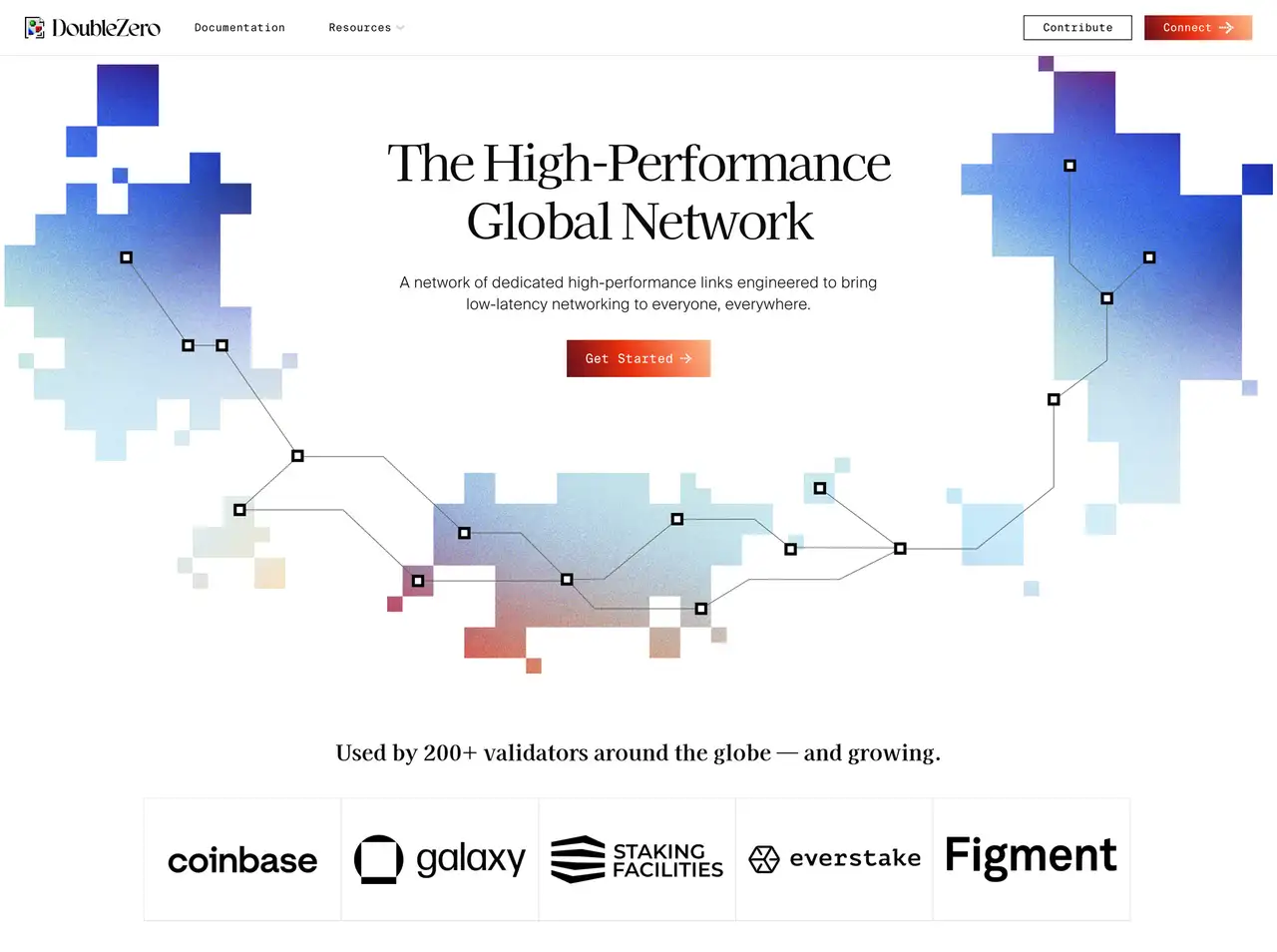
DoubleZero directly connects Solana validators and RPC nodes via private optical fiber, minimizing congestion and route fluctuations that occur over the public internet.

The DoubleZero network operates a 100Gbps dedicated route connecting Chicago (CHI), Salt Lake City (SLC), and Los Angeles (LAX).
With the establishment of the SLC region, ERPC now operates at the core of this route, shortening the data path between the Midwest and West Coast and achieving more consistent transmission.
With the establishment of the SLC region, ERPC now operates at the core of this route, shortening the data path between the Midwest and West Coast and achieving more consistent transmission.
Proximity to Jito BlockEngine
Jito BlockEngine is deployed in Salt Lake City, and ERPC has built its nodes within the same network environment.
This enables zero-distance communication with BlockEngine, minimizing transaction transmission routes.
While SLC has always been geographically close to BlockEngine, the lack of suitable high-performance VPS infrastructure previously limited operational efficiency.
With this deployment, ERPC provides a low-latency, cost-efficient, and stable foundation for Solana developers and operators.
This enables zero-distance communication with BlockEngine, minimizing transaction transmission routes.
While SLC has always been geographically close to BlockEngine, the lack of suitable high-performance VPS infrastructure previously limited operational efficiency.
With this deployment, ERPC provides a low-latency, cost-efficient, and stable foundation for Solana developers and operators.
The Source of Performance Difference
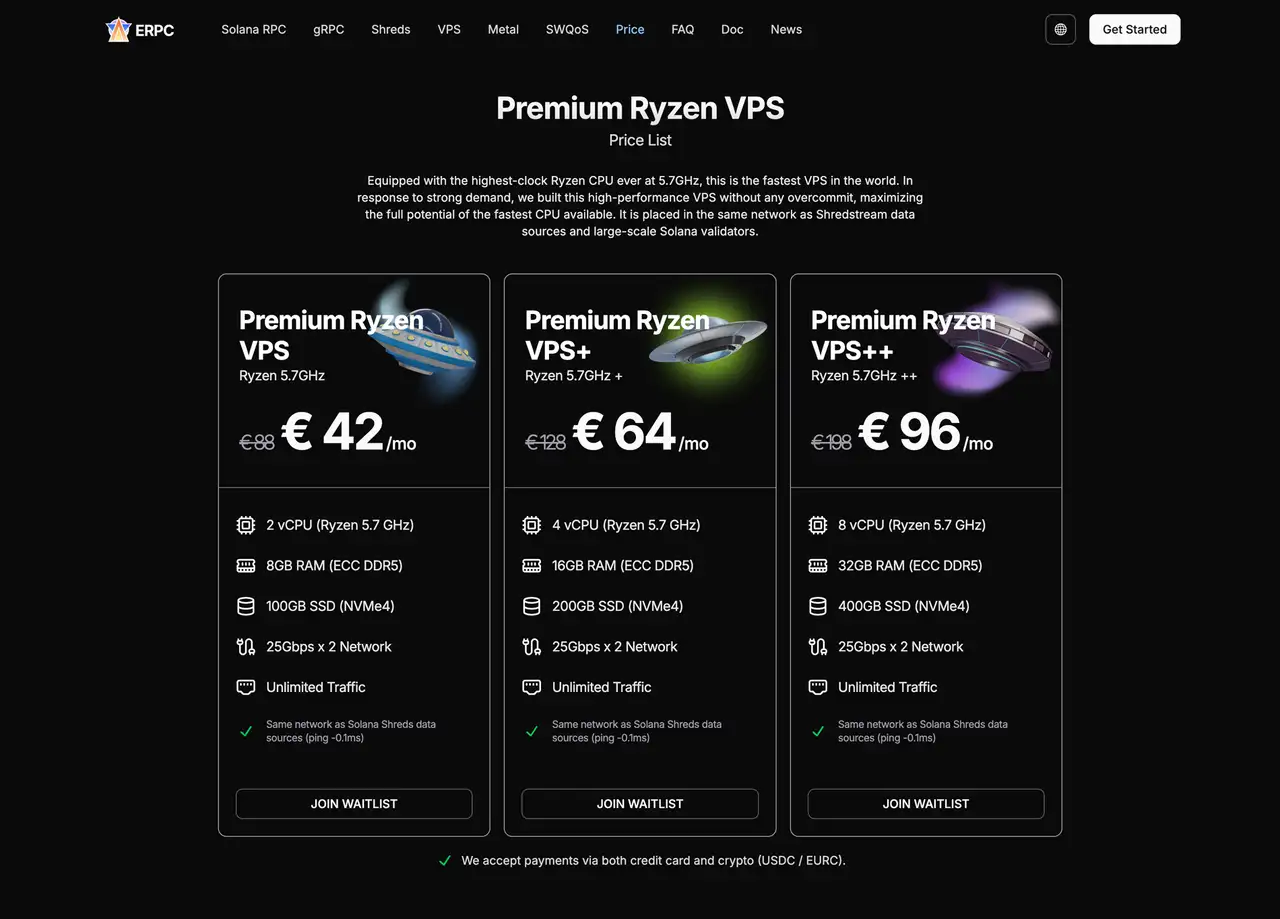
The ERPC Premium Ryzen VPS lineup is built on 5.7GHz high-clock Ryzen CPUs with ECC DDR5 memory, NVMe4 storage, and dual 25Gbps networking — designed with zero overcommitment.
It delivers bare-metal–class consistency and responsiveness in a virtualized environment, ensuring stable performance for computation and network operations alike.
It delivers bare-metal–class consistency and responsiveness in a virtualized environment, ensuring stable performance for computation and network operations alike.
This architecture represents the foundation of ERPC’s high-performance infrastructure shared across all regions, and SLC offers the same Premium VPS plans.
High clock speed, ECC memory integrity, and guaranteed bandwidth together enable the reliable processing required by Solana RPC environments.
The balance between performance and cost efficiency is what defines the strength of this configuration.
High clock speed, ECC memory integrity, and guaranteed bandwidth together enable the reliable processing required by Solana RPC environments.
The balance between performance and cost efficiency is what defines the strength of this configuration.
Limited Shredstream: A New Option
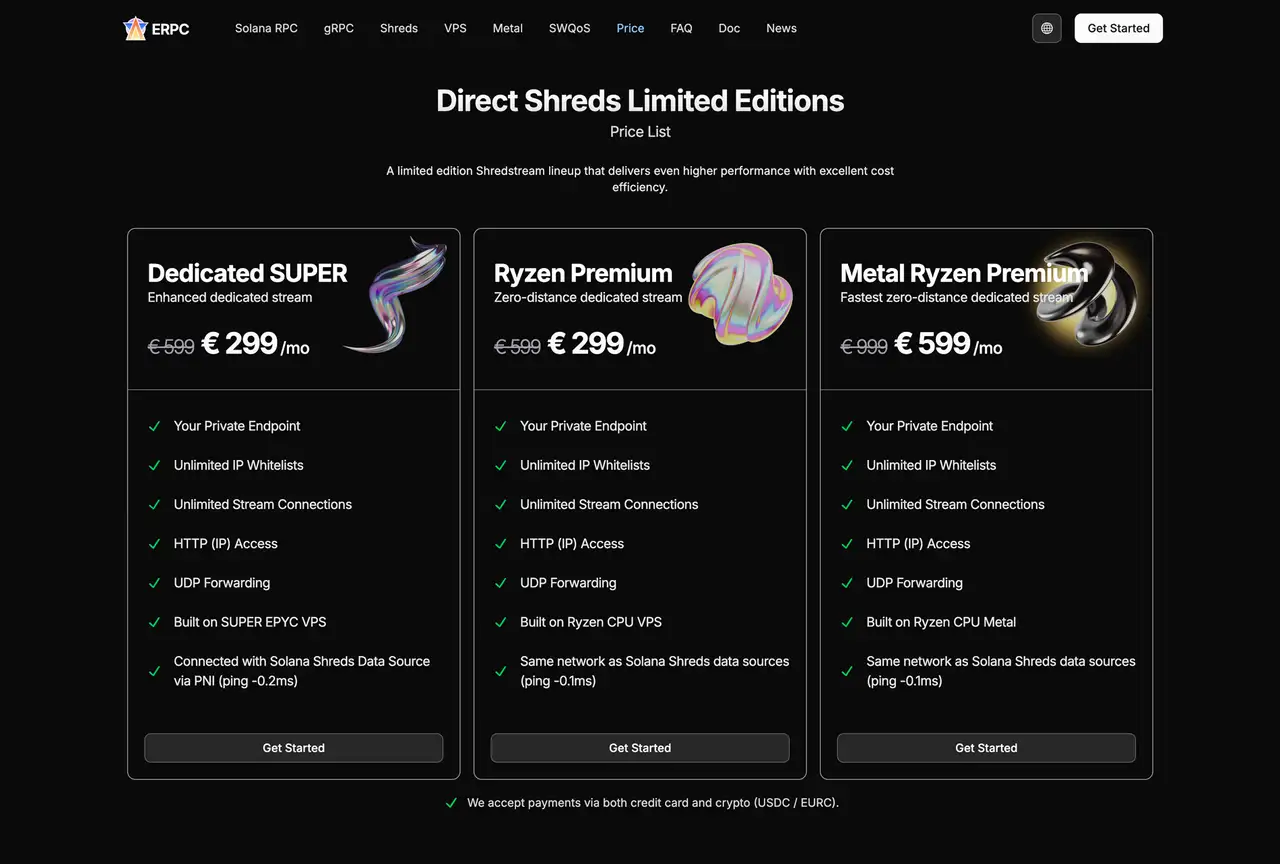
Shredstream uses UDP for ultra–low-latency delivery.
Because UDP does not employ retransmission control, network distance and stability have a direct impact on performance consistency.
ERPC has addressed this by placing resources within the same network as Jito BlockEngine in SLC, minimizing packet loss and jitter.
Because UDP does not employ retransmission control, network distance and stability have a direct impact on performance consistency.
ERPC has addressed this by placing resources within the same network as Jito BlockEngine in SLC, minimizing packet loss and jitter.
The Limited Shredstream (Ryzen configuration) is a dedicated setup built on the Premium Ryzen VPS foundation.
Testing and user reports confirm that it performs over 87% faster than previous dedicated Shredstream offerings.
Compared to shared Shredstream, it delivers higher stability and consistency, demonstrating clear advantages in production environments.
Users migrating from Dedicated Shredstream report immediate, observable performance gains.
Testing and user reports confirm that it performs over 87% faster than previous dedicated Shredstream offerings.
Compared to shared Shredstream, it delivers higher stability and consistency, demonstrating clear advantages in production environments.
Users migrating from Dedicated Shredstream report immediate, observable performance gains.
Solana RPC Bundle Plan

Many developers start with WebSocket or Geyser gRPC to work with real-time Solana data streams.
These decoded streams are easy to integrate and well-documented, making them suitable for onboarding and prototyping.
These decoded streams are easy to integrate and well-documented, making them suitable for onboarding and prototyping.
Advanced users, however, adopt the faster Shredstream.
There is a growing demand to maintain stable gRPC-based applications while simultaneously integrating faster Shreds through parallel development — a need that ERPC’s Bundle plan fulfills.
There is a growing demand to maintain stable gRPC-based applications while simultaneously integrating faster Shreds through parallel development — a need that ERPC’s Bundle plan fulfills.
Previously, developers faced high costs and complex environments when attempting to upgrade to faster connections.
With the Bundle plan, those already using RPC and gRPC can add Shredstream at a lower combined rate, lowering the entry barrier for high-speed connectivity.
With the Bundle plan, those already using RPC and gRPC can add Shredstream at a lower combined rate, lowering the entry barrier for high-speed connectivity.
This allows teams to build a base application using RPC + gRPC, and then transition seamlessly toward high-performance Shredstream integration.
Advanced users can directly ingest both processed and confirmed data from Shredstream, using custom client logic.
Bundle provides a reliable, ready-to-use path toward that advanced setup.
Advanced users can directly ingest both processed and confirmed data from Shredstream, using custom client logic.
Bundle provides a reliable, ready-to-use path toward that advanced setup.
The gRPC endpoints included in Bundle have no filter limitations and are compatible with Devnet and Testnet during product development, offering a consistent environment from testing to production.
For most developers, Bundle is the fastest and most practical way to begin real-time Solana development and scale directly into production.
Inquiries regarding setup or migration can be made via the official Validators DAO Discord.
- Validators DAO Official Discord: https://discord.gg/C7ZQSrCkYR
Challenges Addressed by ERPC and Validators DAO
- Transaction failures and latency fluctuations often observed in RPC environments
- Performance throttling imposed by many infrastructure providers
- The significant impact of physical network distance on communication quality
- Limited access to high-quality infrastructure for small-scale projects
During the development of Epics DAO, an open-source Solana NFT card game project, we recognized the lack of accessible, high-performance Solana infrastructure.
To solve this, we built our own platform and extended that expertise into ERPC and SLV.
To solve this, we built our own platform and extended that expertise into ERPC and SLV.
Financial applications are particularly mission-critical — even small delays or errors directly affect user experience.
In Solana development, the combination of distributed validators and Web3-specific architecture makes achieving consistency difficult, leaving many projects struggling with latency and instability.
In Solana development, the combination of distributed validators and Web3-specific architecture makes achieving consistency difficult, leaving many projects struggling with latency and instability.
We provide the robust infrastructure necessary for reliable operation, contributing to a better development and user experience across the Solana ecosystem.
Both ERPC and SLV are positioned as core components of that effort.
Both ERPC and SLV are positioned as core components of that effort.
- ERPC Official Website: https://erpc.global
- SLV Official Website: https://slv.dev
- elSOL Official Website: https://elsol.app
- Epics DAO Official Website: https://epics.dev
- Validators DAO Official Discord: https://discord.gg/C7ZQSrCkYR


